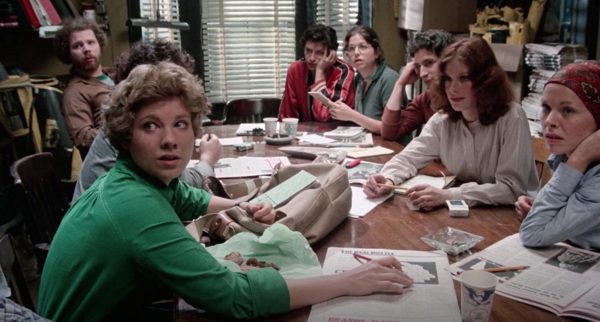Film Commentary: “Between the Lines” Eulogizes the Beginning of the End of Boston’s Alt-Weekly Era
By Brett Michel
Even 42 years ago, disillusionment was setting in among the workers at alt-weekly papers like The Real Paper and The Boston Phoenix.

A scene from “Between the Lines.”
Between the Lines Starring John Heard, Lindsay Crouse, Jeff Goldblum, Jill Eikenberry, Stephen Collins, Gwen Welles, Bruno Kirby, Lewis J. Stadlen, Jon Korkes, Richard Cox, Joe Morton, Lane Smith, Charles Levin, Raymond J. Barry and Michael J. Pollard. Written by Fred Barron, from a story by Barron and David Helpern. Directed by Joan Micklin Silver. At the Brattle Theatre, Cambridge, MA through May 20.
Early on in Joan Micklin Silver’s Boston-set time capsule, 1977’s Between the Lines (a new digital restoration is screening at the Brattle Theatre), an idealistic young film critic played by Charles Levin is nearly laughed out of a staff meeting in the offices of the fictional Back Bay Mainline when he suggests that the editor of the alternative weekly newspaper (Jon Korkes) should consider sending him to France to cover the Cannes Film Festival, convinced that his coverage would be “a very prestigious thing.” Even 42 years ago, however, disillusionment was setting in among the workers at alt-weekly staples like The Real Paper (which would fold in 1981) and The Boston Phoenix (which ceased publication in 2013), where Fred Barron, this scrappy little picture’s screenwriter, had cut his teeth reviewing movies.
Jeff Goldblum’s Max, the Mainline’s rock critic, has already accepted the limits of his local fame, scamming free drinks (and dates) from readers in lieu of a lucrative income, while earning a few extra dollars for weed from selling promotional LPs he receives for review. “I can’t smoke records,” he tells David (Bruno Kirby), as the two walk through Harvard Square on their way to Cheapo Records. It’s never quite clear what David’s position is at the paper, other than idolize the narcissistic staff writers, who seem more interested in writing books than covering the counterculture that’s begun to pass them by.
One such character, Michael (Stephen Collins), doesn’t let the constant rejection letters from publishers deter him from staying home to toil on his tome rather than go into the office, as his long-suffering girlfriend, Laura (Gwen Welles), supports the former firebrand by working two jobs. Likewise, it’s Abbie (Lindsay Crouse), the paper’s talented photographer, who finds herself pulling double-duty as she accompanies sometime flame Harry (John Heard), the Mainline’s other burnt-out star reporter, to a strip club in the old Combat Zone as he disinterestedly interviews a dancer (a pre-Taxi Marilu Henner) for a profile he could care less about. Taking over the conversation, Abbie bruises Harry’s fragile ego, even as she asks questions that will ultimately improve his piece. Hell, even the paper’s receptionist (Jill Eikenberry) effectively manages the office, coddling the neurotic men around her with a den mother’s flair and—it being the ‘70s—the occasional joint.
But then, it’s little surprise that Silver, one of the rare female directors to get projects produced during the era (including 1975’s Hester Street and 1979’s Chilly Scenes of Winter, which featured another standout performance by Heard), would present women as the bedrock of her ensemble cast. Two of this group of then-fresh faces had previously acted in films by Robert Altman (Goldblum and Welles also appeared in both 1974’s California Split and 1975’s sprawling masterpiece, Nashville), a filmmaker Silver pays tribute to here with her scenes of overlapping dialogue, casual sex, and the threadbare plot that barely holds it all together.
Lane Smith briefly appears as a mainstream newspaper magnate who’s possibly interested in buying the Mainline, which threatens to wipe out the radical ideals and “muckraking” the alt-weekly built its reputation on. Even without a buyout, however, the paper’s edge had already dulled, an underlying joke that stings for this writer, who joined The Boston Phoenix as a contributing film critic in 2003, decades after the waning glory days that are eulogized in an appropriately ramshackle way here.
Silver derives some decent comic mileage out of the mistreatment and contempt of Stanley (Lewis J Stadlen), the Mainline’s advertising director, the butt of this film’s jokes and a man who ironically lacks a sense of humor. Nevertheless, the best, most knowing gag occurs during the opening credits, when a street vendor played by inimitable character actor Michael J. Pollard raps on car windows, hawking the Mainline to drivers in Copley Square traffic. Summing up much of what we’re in for, he promises consumers “All the news behind the news, all the hilarity behind the hilarity…and some hippie smut.”
Boston native Brett Michel has been penning love (and hate) letters to cinema in a professional capacity for the past 16 years, first finding his voice as a critic for the late, lamented Boston Phoenix during its final decade, before rising from the newspaper’s ashes as a frequent contributor to a wealth of local publications. In addition to his work for the storied alt-weekly, he has written for The Boston Herald, The Patriot Ledger, The Tab, The Metrowest Daily News and, most recently, The Improper Bostonian, where he served as the magazine’s Film Editor for the last 5 years.
